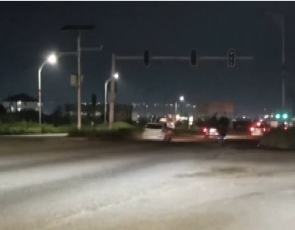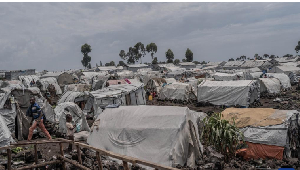- Home - News
- TWI News | TV
- Polls
- Year In Review
- News Archive
- Crime & Punishment
- Politics
- Regional
- Editorial
- Health
- Ghanaians Abroad
- Tabloid
- Africa
- Religion
- Election 2020
- Coronavirus
- News Videos | TV
- Photo Archives
- News Headlines
- Press Release
General News of Sunday, 16 June 2002
Source: Ebo Quansah for Public Agenda
NPP At Crossroads
When the New Patriotic Party was voted into office on December 28, 2000, after 19 years of authoritarian rule by Flt Lt Jerry John Rawlings, there was general euphoria. Most Ghanaians danced on the streets of cities, towns and villages across the country to welcome a Government they thought could deliver the country from the bottom of the economic pit.
To most Ghanaians, the assumption of office by John Agyekum Kufuor, the man his admirers call ‘Gentle Giant’ of Ghana politics, marked a watershed in the political evolution of the country after years of austerity that seemed to be ending no where. Nearly half way through the first term of office, there is despondency in many homes. Most Ghanaians are enable to eke a meaningful living from their earnings. Most of the promises made by the ruling party on the campaign trail remain unfulfilled.
"While the NPP Government goes about trumpeting its so-called achievements, the majority of Ghanaians are suffering. Prices of goods and services are sky high: school fees have gone up substantially; and, water and electricity charges were increased by well over 100 percent last year. Further increases in utility tariffs are threatened. Petrol prices were increased by 65 percent and postal and telephone charges were huge,” charged the opposition NDC in a press statement read by General Secretary Dr N. Josiah-Aryeh. Said the NDC scribe: “On the other hand, public sector wages and salaries were increased by a meager 20-30 per cent and the plight of the unemployed has worsened.
A number of gimmicks have been used to raise and dash their hopes. Countrywide registration of the unemployed undertaken last year, appears to have only added insult to injury as it has led to no jobs for the unemployed. Street beggars and destitutes who were similarly registered are also waiting patiently for their share of jobs.” According to the NDC, “a wide and ironic gap has emerged between official rhetoric and harsh reality.
In the President’s State of the Nation address earlier this year, he alluded to ‘previous governments producing budgets that bore no resemblance to realities on the ground.’ That, indeed, is an excellent summary of the NPP’s economic performance to date.” The NDC had even harsher description for the performance of the NPP administration. “It appears that nepotism and parochialism are the guiding principles for appointment by the NPP Government.
At the last count, well over 20 close relatives of the President had been appointed into privileged positions, many of them ill-equipped but earning thousands of dollars a month. The effect of this narrow agenda is to exclude wide sections of the citizenry from participation in public affairs and the effective running of their country.” This is countered by Dan Botwe, General Secretary of the NPP who is under no illusion about where the Government has taken the nation from and its performance so far.
On the whole, I must say that the government has done very well. You cannot make any meaningful assessment without considering where we came from and what we came to meet. To begin with the economy, the NPP administration has done very well. In the general governance of this country too, we have a healthy balance sheet. There are the issues of armed robbery, the problem with the Fast Track Court which detract attention and create problems.. In spite of that the cedi has been stabilized and inflation and interest rates brought down. What the Government is expected to do is to turn round the economy to enable it build upon it. What we are saying is that in assessing the government’s performance you have to put things in the right context. The Government has said nowhere that the economy will be put right by 2004.
"In building an economy, you do not have to look at short term solutions. We should not do things as if the country is coming to an end in four years time." The General Secretary assured the teeming supporters that the party is on course to restructure the Ghanaian society and believes the people of Ghana would give it a second term. Beyond the political rhetoric is the cold fact that a number of promises made on the campaign trail are far from being delivered, In the NPP manifesto ‘Agenda for Positive Change,’ the party promises to pursue a 12-point Economic Programme dedicated to what it called: ‘CREATE WEALTH PROGRAMME aimed at creating jobs for all persons able and willing to work and to reward each of them appropriately. There is a pledge to reduce the tax burden especially on workers and pensioners, and on the poor; reduce inflation and stabilize the exchange rate. It pledged to empower all Ghanaians, especially “our women and youth, by supporting their entrepreneurial initiatives, accelerate growth and development of Ghana in order to enhance opportunities and raise the standard of living for all Ghanaians.
The party promised to “take all the appropriate measures to promote industry and agriculture by strengthening and promoting Ghanaian entrepreneurship in order to ensure that Ghanaians take hold of their own destiny and that economic growth benefits the Ghanaian people." It also promised to “ensure access to health care and quality education for all and in particular promote scientific and technological advancement in Ghana. The manifesto talked of working to promote home ownership among Ghanaians as a means to strengthen the family and provide economic as well as encourage personal savings. There was promise to alleviate poverty and ensure a respectable safety net that enhances human dignity for the poor and disadvantaged.
Coming after 19 years of one of the most oppressive regimes ever to take the centre stage in this country, the promises the NPP made were music in Ghanaian ears. True to its promise, the Government took off on a very bright note, with a lot of goodwill from the ordinary people of this nation. On Wednesday, April 18, 2001 President John Agyekum Kufuor faced the media at a historic press conference to mark 100 Days in Office. The press conference itself was a novelty. For the nearly 20 years that ex-President Jerry John Rawlings took the centre stage of national politics, he never met the press. Kufuor was therefore the darling of the media for daring to face them to answer questions on the governance of the nation. A number of controversial issues were raised. The president called for a debate on the national wage. He told his audience that his monthly wage of ?1.9m was not commensurate with his position as the Chief Executive of the republic.
“The nation must come to terms with the situation that the prevailing structures for wages and prices are not the best and something ought to be done about them. It calls to radical and purposeful thinking and that is why an open debate is needed.” Not much debate took place on the wage structure. But within the past 18 months, the Government has raised the minimum wage twice. At the time the NPP took office, the minimum wage was c4,200. The Government raised it to ?5,500 last year and quite recently to ?7,150. Against these increases in wages are the spiraling hike in the cost of goods and services. Tariffs on the utilities – electricity and water, were hiked to more than 90 percent. They are still asking for more.
At the press conference, the President spoke of bold attempts to take over the governance of the country, which threatened, at one point in time, to explode. “The first task the government set itself to do was to take hold of the structures of Government, which had been established, controlled and nurtured for 18 years by the same group of persons in pursuit of a vision totally different from his government."
One major economic initiative announced at the President’s fist sessional address was that the Government intended to access the HIPC initiative. At his press conference, the President explained that the NPP had to take the country into HIPC because the bankruptcy of the economy was such that there was no alternative. "All we have done by opting for HIPC initiative is that we decided to tell the truth to the nation which is that Ghana was poor and heavily indebted and could not service her debts." Ghana reached the decision point in record time and a number of Western creditors granted debt relief to the nation.
But the economy is far from being out of the woods.
A number of the unemployed are still waiting for jobs that are not coming. In Kumasi, the Ashanti Regional capital, from where the NPP have a number of safe seats, the popular saying on the streets is: ‘Medofo Adadaame.’ I have been deceived by my lover, a clear allusion that the Government they support, has been disappointing.
Three ministers of state and the Security Head have resigned from the rank of the NPP administration for various reasons. Madam Hawa Yakubu, the charismatic Minister of Tourism abandoned ship to concentrate on her role in the ECOWAS Parliament. Two former Northern Ministers – Alhaji Malik Alhassan Yakubu, Former Minister of Interior, one of the most respected Cabinet Member in the Kufuor Administration and Prince Imoro Andani, Northern Regional Minister as well as Lt-Gen Joshua Hamidu, Security Advisor to President Kufuor were all forced to resign over the assassination of Ya-Na Yakubu Andani II. A commission of enquiry headed by Justice I.N.K. Wuaku, a former Supreme Court Judge is sitting in Sunyani to unravel the mystery. But already, the number of resignations have seriously undermined the Government’s regional balancing equation.
The people are still waiting for the Government to implement the abolition of the ‘Cash and Carry’ system at the hospitals under which many patients are at risk.
The Government’s education for all policy at the tertiary level was shredded by the University of Ghana which was found to be charging ?14.5m for students who failed to be within Legon’s admission cut-off point of aggregate 16. Students reading any of the sciences through the back door are required to fork out ?10.5m per annum while the humanities attract ?8m fees.
Recently, the Government was rocked by series of leakages in the BECE examination forcing the Ministry of Education to cancel the whole examination. Never in the history of examinations in the country have all the papers been cancelled. While the Government is receiving the flack for this massive fraud on the education front, there are others too who think the Government showed courage and commitment to standards by its decision to cancel the paper altogether.
The Government’s law and order policy is seriously being undermined by a spate of armed robbery that brought fear into the citizenry. But there is evidence of late that the combination of the Police and military operations are gradually winning the war.
The Government’s policy of Zero Tolerance was widely applauded when former Deputy Minister Victor Selormey and Youth and Sports Minister Malam Yusuf Isa were jailed for various offences. But the stalling of the trial of many NDC functionaries in the Quality Grain saga, forced by the declaration of the Fast Track High Court as illegal by the Supreme Court, following a suit brought by former Ghana National Petroleum Corporation Chief Executive Tsatsu Tsikata, has thrown the judicial process in this country into disarray.
The Sahara deal under which crude oil was carted from Nigeria is still attracting criticism.
The food situation has improved slightly in the sense that food is still on the market in the lean season. The prices though are still prohibitive sending warning signals that the agricultural policy is still not fine-tuned.
There are disturbing reports that many in the leadership positions in the NPP Administration are failing the Zero Tolerance test. While these reports have not yet been verified, there is the growing perception that all is not well among NPP officials themselves. The way and manner officials are queuing to lash at Kofi Wayo who stood as a Parliamentary Candidate for East Ayawaso tells a story of a Government Party which centre cannot hold.
At nearly half way mark in the Kufuor Administration’s first term of office, the balance sheet is beginning to shift towards the negative. Both the President and his team have a lot to do to restore the confidence of the population, who danced on the streets to welcome the Positive Change inaugurated before the eyes of the people at Parliament House and at the Independence Square on January 7, 2001. It has not done badly, though. It can only improve on its performance.
Opinions









